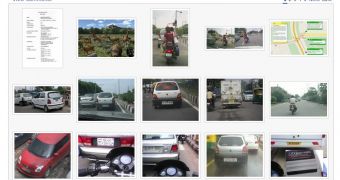Tales of driving through many of India’s largest cities read more like horror stories than anything else. The streets are notoriously crowded and the drivers turn to any trick they can to get ahead. But with so many cars on the road and so few of them actually obeying the laws, the police have felt rather powerless. So they’ve turned to an unlikely ally, Facebook.
New Delhi’s traffic police has set up a Facebook page, something we’re seeing more often even in developing countries. But what’s interesting about its approach is that it’s using the site to ask for help from the people on the streets, specifically, it’s asking them to submit photos of unruly drivers.
And, as the New York Times reports, it seems to be working. To date, Facebook users in New Delhi have submitted close to 3,000 photos incriminating other drivers. And the police have taken notice, issuing 665 tickets based on those photos so far. In a city with 12 million people, that’s probably not going to make much of a difference, but it’s a step forward. With only 5,000 traffic officers in total, Facebook is probably the only way the police could expand its ‘coverage.’
The police caution drivers not to get to impassioned by this, putting themselves at danger. It also warns them to not let personal vendettas cloud their judgement. For the most part, response from the people has been positive with many welcoming the move.
“Wow! My congratulations to DTP for setting up this page. Great to have the 'mamaji' up here on FB :-). Each time I have visited the city, I've seen an improvement in traffic,” Facebook user Aishvarya Sharma commented on the page.
There are those concerned by the move though. They argue that encouraging people to report each other could lead to ‘which hunts’ of sorts. Overall though, it’s probably not going to make a huge difference. Most people in the country, even in the largest cities, don’t have access to the internet.

 14 DAY TRIAL //
14 DAY TRIAL //